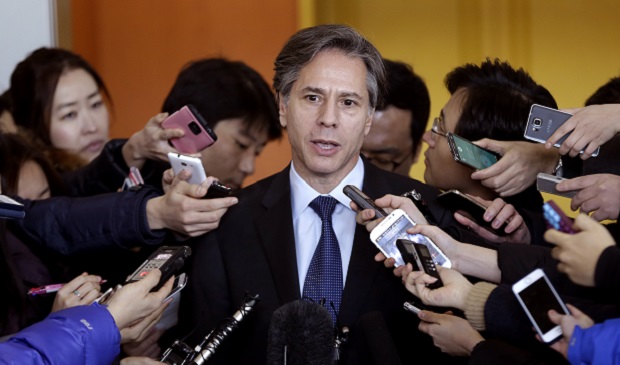US envoy urges China ‘leadership’ in sanctioning N. Korea

U.S. Deputy Secretary of State Antony Blinken speaks to the media after meeting with his South Korean counterpart Cho Tae-yong at the Foreign Ministry in Seoul, South Korea, Monday, Feb. 9, 2015. AP FILE PHOTO
SEOUL, South Korea—Calling North Korea the greatest source of instability in Asia, a top US diplomat urged China on Wednesday to “show leadership” in international efforts to sanction Pyongyang following its fourth nuclear test.
US Deputy Secretary of State Tony Blinken, who was in Seoul on a two-day visit, noted China had a particular role to play given its “special relationship” with its reclusive neighbor.
READ: US tells China to end ‘business as usual’ with North Korea
Blinken will meet with Chinese diplomats in Beijing on Thursday, ahead of a scheduled trip to China by US Secretary of State John Kerry next week, as Washington seeks to ramp up pressure on Beijing.
“We are looking to China to show leadership on the issue,” Blinken said, after talks with South Korean Foreign Minister Yun Byung-Se.
Article continues after this advertisementChina is North Korea’s chief diplomatic protector and economic benefactor, but traditional ties have become strained as Beijing’s patience has worn thin with Pyongyang’s behaviour and unwillingness to rein in its nuclear weapons ambitions.
Article continues after this advertisementREAD: South Korea leader calls for Chinese help to punish North Korea
But China’s leverage over Pyongyang is mitigated, analysts say, by its overriding fear of a North Korean collapse and the prospect of a reunified, US-allied Korea directly on its border.
“Every country in this region wants stability. North Korea is the greatest source of instability in the region,” the visiting US envoy said. “Together, collectively, we have to deal with that,” he added.
Yun echoed Blinken’s view, saying it is now “North Korea versus the international community.”
Blinken’s trip is the latest in a flurry of diplomatic exchanges focused on Northeast Asia, as the international community seeks to squeeze North Korea with fresh sanctions for its latest nuclear test on January 6.
“Everything is on the table” at the UN Security Council, Blinken said about the sanctions being considered. “But (we are) also looking at this independently and in partnership with other countries.”